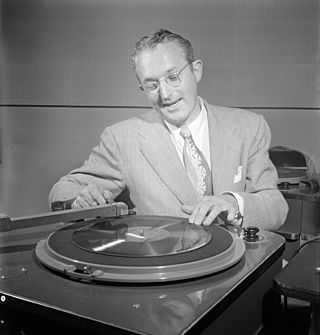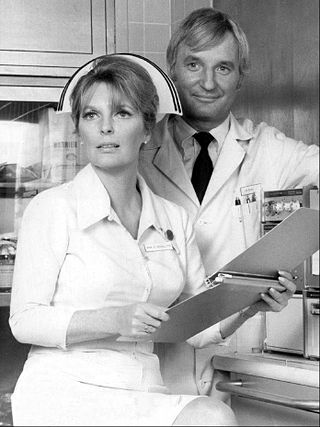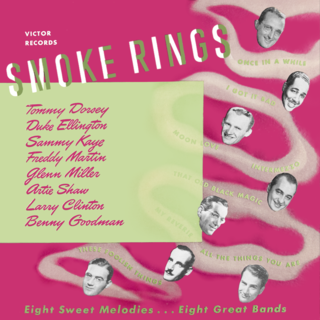
Thomas Francis Dorsey Jr. was an American jazz trombonist, composer, conductor and bandleader of the big band era. He was known as the "Sentimental Gentleman of Swing" because of his smooth-toned trombone playing. His theme song was "I'm Getting Sentimental Over You". His technical skill on the trombone gave him renown among other musicians. He was the younger brother of bandleader Jimmy Dorsey. After Dorsey broke with his brother in the mid-1930s, he led an extremely successful band from the late 1930s into the 1950s. He is best remembered for standards such as "Opus One", "Song of India", "Marie", "On Treasure Island", and his biggest hit single, "I'll Never Smile Again".

The Pied Pipers is an American popular singing group originally formed in the late 1930s. They had several chart hits through the 1940s, both under their own name and in association with Tommy Dorsey, with Johnny Mercer and with Frank Sinatra.

Robert William Troup Jr. was an American actor, jazz pianist, singer, and songwriter. He wrote the song "Route 66" and acted in the role of Dr. Joe Early with his wife Julie London in the television program Emergency! in the 1970s.

Melvin James "Sy" Oliver was an American jazz arranger, trumpeter, composer, singer and bandleader.
"Again" is a popular song with music by Lionel Newman and words by Dorcas Cochran. It first appeared in the film Road House (1948), sung by Ida Lupino. An instrumental rendition was used in the movie Pickup on South Street (1953). By 1949, versions by Vic Damone, Doris Day, Tommy Dorsey, Gordon Jenkins, Vera Lynn, Art Mooney, and Mel Tormé all made the Billboard charts.

American vocalist Frank Sinatra recorded 59 studio albums and 297 singles in his solo career, spanning 54 years. Sinatra signed with Columbia Records in 1943; his debut album The Voice of Frank Sinatra was released in 1946. Sinatra would achieve greater success with Capitol and Reprise Records, the former of which he released his final two albums on—Duets and Duets II. Eight compilation albums under Sinatra's name were released in his lifetime, with more albums released following his death in 1998.

The Song Is You is a 1994 box set by American singer Frank Sinatra.
"Please Don't Talk About Me When I'm Gone" is a song published in 1930. It was written by Sam H. Stept with lyrics by Sidney Clare. The original publication also credited singer Bee Palmer as co-composer.
"Imagination" is a popular song with music written by Jimmy Van Heusen and the lyrics by Johnny Burke. The song was first published in 1940. The two best-selling versions were recorded by the orchestras of Glenn Miller and Tommy Dorsey in 1940.
"Dancing in the Dark" is a popular American song, with music by Arthur Schwartz and lyrics by Howard Dietz, that was introduced by John Barker with Tilly Losch dancing in the 1931 revue The Band Wagon. The song was first recorded by Bing Crosby on August 19, 1931 with Studio Orchestra directed by Victor Young, staying on the pop charts for six weeks, peaking at #3, and helping to make it a lasting standard.
The 1941 recording by Artie Shaw and His Orchestra earned Shaw one of his eight gold records at the height of the Big Band era of the 1930s and 1940s. Shaw's 1940 arrangement was a collaboration between Shaw and his chief arranger, Lenny Hayton, who was also an important Music Director, Music Arranger and Orchestrator at MGM until 1953.
"Nice Work If You Can Get It" is a popular song and jazz standard composed by George Gershwin with lyrics by Ira Gershwin.

Frank Sinatra & the Tommy Dorsey Orchestra is a 1998 compilation album by the American singer Frank Sinatra.
"There Are Such Things" is a popular song by Stanley Adams, Abel Baer, and George W. Meyer, published in 1942. The first and most popular version of the song was performed by Tommy Dorsey's orchestra with vocals by Frank Sinatra and The Pied Pipers, which reached No. 1 on the US best-selling records chart in 1942. This version hit No. 2 on the Harlem Hit Parade chart. There have been many other versions recorded since.
"Let's Get Away from It All" is a popular song with music by Matt Dennis and lyrics by Tom Adair, published in 1941.

"I'm Always Chasing Rainbows" is a popular Vaudeville song. The music is credited to Harry Carroll, but the melody is adapted from Fantaisie-Impromptu by Frédéric Chopin. The lyrics were written by Joseph McCarthy, and the song was published in 1917. It was introduced in the Broadway show Oh, Look! which opened in March 1918. The song was sung in the show by the Dolly Sisters. Judy Garland sang it in the 1941 film Ziegfeld Girl. It was subsequently sung by Jack Oakie in the 1944 film The Merry Monahans and was again featured in the 1945 film The Dolly Sisters, where it was sung by John Payne. It was also included for part of the run of the 1973 revival of Irene.
"Oh! Look at Me Now" is a 1941 song composed by Joe Bushkin, with lyrics by John DeVries. It is strongly associated with Frank Sinatra, who first recorded it with Tommy Dorsey and his orchestra, in an arrangement by Sy Oliver. Sinatra re-recorded the song for his 1957 A Swingin' Affair!, this time arranged and conducted by Nelson Riddle.

All Time Greatest Hits, Vol. 1-4 are four compilation albums, issued by RCA of early 1940s Tommy Dorsey tracks featuring Frank Sinatra.
"In the Blue of Evening" is a song by Al D'Artega and Tom Adair recorded and released in 1943 by Tommy Dorsey and his Orchestra, with Frank Sinatra as the main vocalist. It was subsequently re-recorded by Sinatra, but did not feature on a release until a 1993 reissue of the album I Remember Tommy.

Up Swing is a compilation album of phonograph records released by bandleaders Tommy Dorsey, Glenn Miller, Benny Goodman, and Artie Shaw in 1944 as a part of the Victor Musical Smart Set series. The set, a progenitor to greatest hits releases, features some of the most popular Dance Band Era recordings by the four bandleaders.

Smoke Rings is a compilation album of phonograph records released by Victor Records in 1944 featuring Swing-era recordings of eight bandleaders as a part of their Musical Smart Set series. The set was released in conjunction with Up Swing during the American Federation of Musicians strike and features popular recordings by the various artists.











